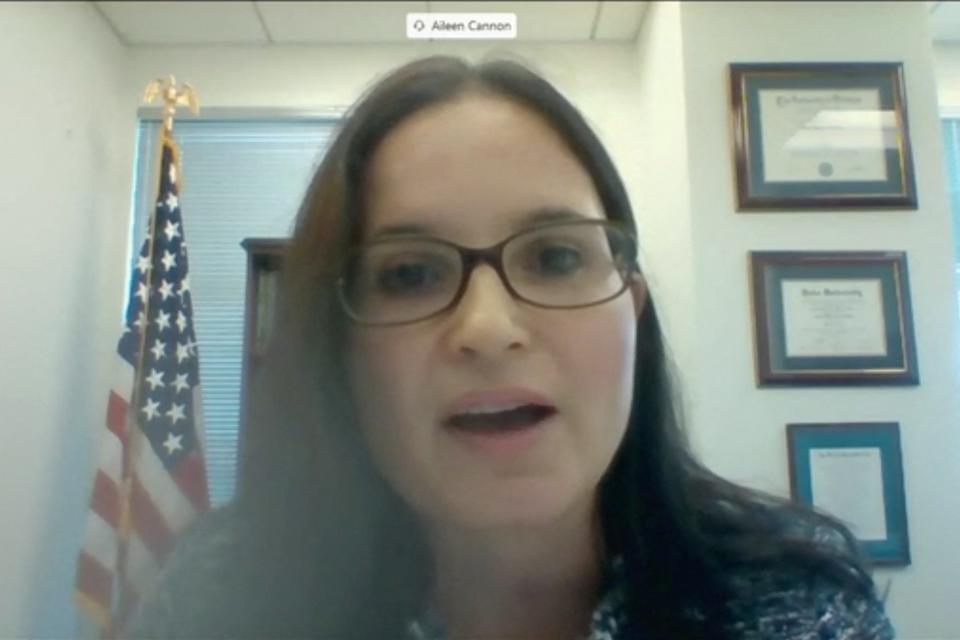Special counsel Jack Smith urges court to revive Trump's classified document charges
Justice Department special counsel Jack Smith urged a federal appeals court Monday to reinstate the classified documents case against former President Donald Trump by arguing the prosecution team was appointed correctly.
U.S. District Judge Aileen Cannon dismissed the case against Trump last month by ruling Smith’s job is so powerful he should have either been confirmed by the Senate or Congress should have explicitly authorized the post. Trump was charged with taking hundreds of documents that belonged to the government and hoarding them after leaving office.
Smith argued in his appeal to the 11th U.S. Circuit Court of Appeals that two statutes allow the attorney general to name special counsels. For decades, similar appointments have been upheld for decades by other courts, including the Supreme Court. Attorney General Merrick Garland had made a similar argument in testimony to Congress.
“The district court’s contrary view conflicts with an otherwise unbroken course of decisions, including by the Supreme Court, that the Attorney General has such authority, and it is at odds with widespread and longstanding appointment practices in the Department of Justice and across the government,” Smith wrote.
Cannon, who was appointed by Trump, has made a number of unusual decisions in the case that have been favorable to Trump. She has shrugged off concerns about her impartiality from superiors.

Why did Judge Cannon dismiss the charges against Trump?
Trump was charged him with retaining more than 100 national defense records at Mar-a-Lago after leaving the White House and conspiring with two aides to hide them from government authorities.
But his lawyers argued the case was invalid because Smith wasn't appointed or funded constitutionally.
Supreme Court Justice Clarence Thomas appeared to invite a challenge to Smith's appointment when he wrote a concurrence in the high court's presidential immunity decision.
Cannon ruled that Smith's appointment by Attorney General Merrick Garland violated a constitutional provision that requires “Officers of the United States” to be appointed by the president and confirmed by the Senate. She said Smith needed to have gone through that process unless Congress enacted a new law authorizing his appointment.
Cannon recognized the Supreme Court ruled in a case involving former President Richard Nixon that Congress vested the attorney general “the power to appoint subordinate officers” including the Watergate special prosecutor. But she dismissed the statement as “non-binding and unpersuasive.”
Smith argued that the ruling authorizing the appointment was necessary to resolve a legal dispute in 1974 and “therefore constitutes a holding that binds lower courts.”
“The long history of Attorney General appointments of special counsels confirms the lawfulness of the Special Counsel’s appointment,” Smith wrote. “From before the creation of the Department of Justice until the modern day, Attorneys General have repeatedly appointed special and independent counsels to handle federal investigations, including the prosecution of Jefferson Davis, alleged corruption in federal agencies (including the Department of Justice itself), Watergate, and beyond.”

How does Smith justify his appointment?
Smith cited two sections of federal law to justify his appointment. One section empowers the attorney general to commission attorneys “specially appointed” to undertake civil or criminal proceedings. Likewise, another section of law authorized the attorney general to appoint officials to “detect and prosecute crimes against the United States.”
Cannon “erroneously” dismissed previous appointments as “spotty” and “ad hoc,” the prosecutor contended.
“The district court’s contrary reasoning lacks merit,” Smith wrote.
This article originally appeared on USA TODAY: Jack Smith urges court to revive Trump's classified docs charges
